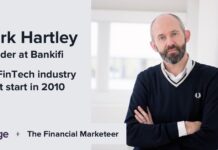Listen to the full interview
An interview with Kimberley Waldron, MD at SkyParlour
Since 2009, my latest guest on the podcast has along with her business partner run a communications agency that works in the fintech space. “We started the business before fintech was what it has become today,” begins Kimberley, MD at Manchester-based SkyParlour.
Tailoring the service
I started our conversation by asking Kimberley how her agency tailors its services to fit with the ever-growing fintech industry. “We’ve grown up as fintech has grown up…so we really understand the big life events that a business in fintech goes through.
“A fintech startup has many life events, so whether they are going through a seed round of funding right through to IPOs or a major merger or acquisition.”
Working within a growing and maturing industry, it seems, is all about understanding and adapting to the stage of life a firm or a brand is at.
“You [always] have that need to be communicating with those different stakeholder markets…[there are] investors, partners, regulators, the big banks and the people you want to employ.”
Operating within the bounds of regulation
As part of the wider financial services sector, I was keen to understand what it’s like for brands operating in the fintech space, particularly when it comes to regulation.
“If you’re a digital banking startup going through the FCA approval process then you need to be thinking about the language that you’re using such as can you use ‘current account’ and can you use certain terminology that alludes more closely to what a traditional bank does?
“As the fintech industry itself has exploded with a number of new entrants there’s been a greater focus on the role of the FCA and how they are operating and I think there’s a little bit more pressure on them as an organisation now to be stringent.”
I asked Kimberley about her experience with how the FCA is going about monitoring and guiding the fintech industry in terms of how it communicates with its stakeholders.
“There are certain events that have happened in the market…like everything that happened with Wirecard and the ongoing investigation into that through to market entrants; Lanistar is the most obvious one that springs to mind where they were spending a lot of money on social media and getting influencers to endorse the product when they were still going through the process with the FCA.
“I think the competitiveness of the industry and the lower perceived barriers to entry in fintech have forced the FCA to become a bit more stringent. I wouldn’t say that they (the FCA) can be everywhere but I do think they are paying a bit more attention to public information in the press and in marketing materials.”
It doesn’t sound like it’s just fintech firms themselves who are under review, “I know, for example, that there has definitely been some backlash on the terminology used around digital banking. I read an article on Sifted recently where actually the media themselves were coming under scrutiny from the FCA.”
Working in the finance space
I asked Kimberley for her take on what makes working on communications with finance different to anything else. “What makes working in the finance space so interesting as a marketeer is making sure that the way that we communicate doesn’t leave any gaps, that you cover all bases and that you’re not making assumptions.
“It comes back to that stakeholder engagement from day one and understanding who you’re communicating to and why and what they want to hear. It’s not always just about what you want to say.”
The inevitable effect of Covid
As is common in 2021, conversation turned to the topic of Covid and effects of the pandemic.
“I think that Covid has opened up the industry a bit and I think that we’re seeing a lot more personality from the fintech space at the moment…it has made clear the role that fintech has to play in our lives.
“Something [else] that’s happening in the wake of Covid is this focus on the valuation of businesses in the financial services space so we’re starting to get a lot of these huge valuations…there’s almost a race to the top [and I think] all of this is adding to the pressure for the industry to prove itself.”
Cutting through the noise
With the scramble for a number of firms to prove themsevles as the most valuable, there’s potential for an increase in ‘noise’ for an already hype-driven market, so I asked Kimberley about her thoughts on how firms are being heard.
“The brands that are making the biggest cut through are taking one of two options when it comes to strategic marketing. There’s headline-grabbing…those are the attention-grabbing, sensationalist headlines about individual businesses or about the impact fintech is going to have on the industry as a whole.
“Another trend that we’re seeing is a step more towards the ESG agenda, so more about where is fintech going to improve the world?”
Kimberley offers up an example of the model that she believes is working well for brands; “the businesses that are taking that Red Bull approach which is don’t just sponsor a team but build the team, so businesses that are thinking from the ground up ‘what are we bringing to the market and how is it sustainable’ are the ones that are going to have the more long-term marketing success in my opinion.”
In addition to being strategic about the type of business you are, Kimberley also spoke of the rise of individuals within the industry. “We’ve seen the emergence of more B2B influencers…that sort of straddle between things like their own podcasts or producing books about the space to being judges and sitting on content panels…a lot of our clients want to appeal to that small group, or they want to join it.”
Using content
Moving from the strategic to the tactical, our conversation turned to content and how brands are using content to further their aims.
“I’ve never been a fan really of ‘gated content’, on a more tactical level we’re seeing this sort of generosity of advice, content and statistics…the industry is definitely more open to more creative marketing and PR.”
Somewhat uniquely amongst my guests to date, Kimberley works ‘agency-side’ within the industry, affording her a unique perspective of the changing briefs of clients she works with.
“The [client] briefs have shifted…maybe eight to ten years ago the industry and B2B PR itself was very introspective. The number of acronyms, industry terminology and press releases that clients wanted to go out but weren’t even used really that were interesting to the business but not news to anyone else, I think we’ve seen a general shift [away from that].
“I think we’ve seen a general shift in the brief in that it’s not ‘we want to talk about us’, it’s more ‘we want to join that conversation’.
Advice for others
“The thing that has served me so well has been that ‘black book’ and that genuine relationship building within the industry,” Kimberley tells me when I ask what advice she would give to anyone embarking on a career in the fintech space.
“It’s a huge expanding industry, but in fintech, people tend to stay…[making contacts] has paid such dividends from an education and sales point of view. I don’t think you can be a fully effective marketeer in fintech if you don’t have that link into the industry.”
Knowing your stuff is important too, “you can’t fake it in fintech, it’s really obvious if you don’t really understand the context of where fintech sits and its relationships and some of the sensitivity [in the industry].
“Fintech is really about improving the front-end, the experience, engagement and delivery to the consumer. There’s a lot of fintech that isn’t about changing or impacting the way that the global financial ecosystem works.”
Kimberley ends our conversation by highlighting how important it is for marketeers to be involved at the very beginning of a fintech firm’s journey.
“One of my frustrations [with the industry is that marketing] has been an afterthought…my advice would be that marketing is the link…we all know that marketing and PR are what’s going to get these products to market.
“We’ve spent a lot of time ourselves pushing for that seat at the table when the decisions are being made, as opposed to after everything has been signed and delivered.”











